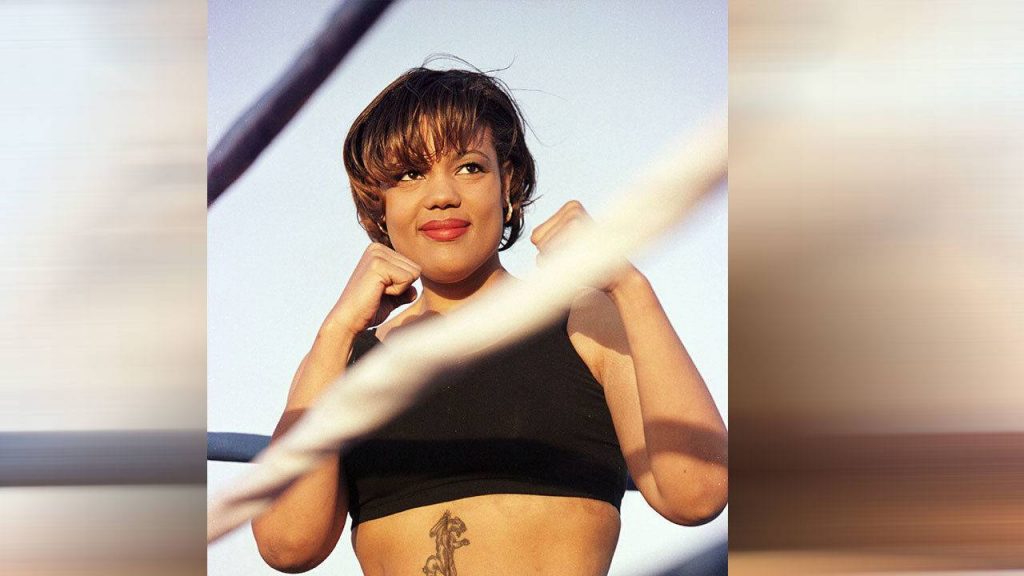Freeda Foreman, the third oldest of 11 children fathered by legendary heavyweight champion George Foreman (6 girls and 5 boys) and herself a former boxer, was found dead in her Houston area home on Friday evening, March 8. KHOU Channel 11 in Houston was the first news outlet to confirm that her death was a suicide. She was found hanging in her closet according to an investigative reporter for the news station. She was 42 years old.
Freeda Foreman was the third of three daughters of a famous fighter to turn pro, following in the footsteps of Laila Ali and Jacqui Frazier-Lyde. They debuted within an eight-month period between October of 1999 and June of 2000. Ali was the trailblazer.
Foreman was working for UPS in Greenville, South Carolina, when she was induced to enter the prize ring. Her backer was Bill Daniels, a cable TV pioneer who owned or co-owned several professional sports teams. A former amateur boxer, Daniels founded America Presents, a boxing promotional company that was run by his nephew Matt Tinley following Daniels death in March of 2000.
Foreman prepped for her boxing debut at the America Presents headquarters in Denver. Her first fight was staged on June 18, 2000, at the Regent in Las Vegas, a new off-Strip hotel-casino that would shortly go bankrupt. Also appearing on the card was Hector Camacho Jr., a fringe contender in the 140-pound weight class, and Maria Johannson, the 34-year-old daughter of Ingemar Johannson who was also making her pro debut.
The show at the Regent was staged on Father’s Day. This was no coincidence.
The promoters hoped to induce George Foreman to attend the show, but he would have no part of it. In common with his contemporary Larry Holmes, Big George said, “I fought so my children wouldn’t have to.”
Freeda Foreman’s purse was reportedly $15,000. Her opponent, a hairdresser from Milwaukee, received $1000. George Foreman reportedly sent Freeda a check for $15,000 as an inducement for her to pull out of the fight. She wouldn’t cash it.
Foreman stopped her faint-hearted opponent in the second round. However, both local boxing reporter Royce Feour and Associated Press correspondent Ken Peters described her performance as amateurish. (Maria Johannson’s fight with Kerrie Frye was a lively 4-round skirmish; Johannson lost a split decision.)
Freeda Foreman, who stood five-foot-ten, weighed 180 pounds for her pro debut and 160 pounds for her subsequent fights. She won her next four starts against no-name opponents and then lost a majority decision to a fighter from New York with an 0-3 record in what would prove to be her final fight. Despite her pedigree and her proclamations to the contrary, her heart was never in the game. She was, in the words of Associated Press sports columnist Tim Dahlberg, soft-spoken and refined, qualities one doesn’t associate with a prizefighter.
Five months before Foreman’s final fight, Laila Ali and Jacquie Frazier-Lyde, both undefeated, squared off in what was perhaps the most ballyhooed female prizefight on American soil. They met at the Turning Stone Casino and Resort on a show held in conjunction with the annual Hall of Fame weekend at the nearby International Boxing Hall of Fame in Canastota, NY.
Ali was an outstanding boxer and Frazier-Lyde, 16 years older than Laila at age 39, wasn’t too shabby, but their 8-round contest, won by Ali on a majority decision, was a disappointment. Frazier-Ali IV, as it was billed, was marred by excessive clinching. A ringside reporter wrote that it resembled a tango.
Freeda Foreman disappeared from the national scene after quitting boxing. A news story in 2004 described her as an animated parishioner at her father’s small church and a helper at her father’s adjacent youth camp which offered instruction in boxing. She also fulfilled her father’s wish to continue her education, earning a degree from Sam Houston State University.
On George Foreman’s twitter page, there is a photo of Freeda in her cap and gown hugging her radiant father on the day of her college commencement. At the time of her death she was reportedly pursuing a master’s degree in criminal justice. She is survived by two children, three grandchildren, her parents and siblings.
Few of us have been untouched by the suicide of someone we admired, perhaps even a family member. It tends to strike those who are the most unlikely victims although authorities on the subject tell us that there are warning signs, albeit signs often so subtle that we are blind to them. If you suspect that someone you know is contemplating suicide, please encourage them to call the National Suicide Prevention Lifeline at 1-800-273-8255. Counselors are available 24/7. And may Freeda rest in peace.





